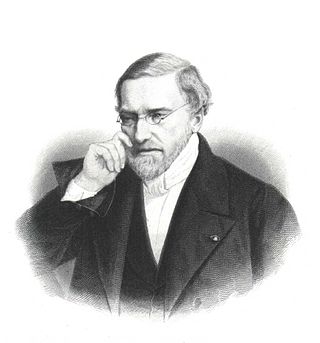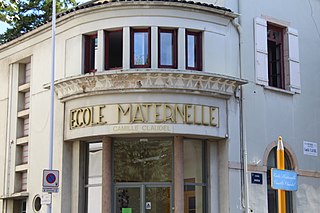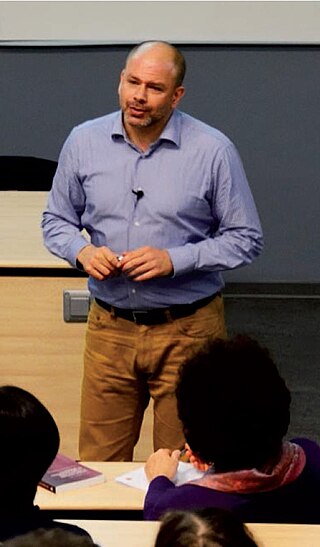Related Research Articles
Fernand Oury was a pedagogue and creator of institutional pedagogy. He recommended and practiced a "school of the people" methodology, in which children were no longer passive receivers, but actively participated in the management of their learning, methods, forms of relations and the everyday life of the class: all of which he called institutions. Some of the notable elements of this methodology were pupils' council, school funds and individualized curricula.

Education in France is organized in a highly centralized manner, with many subdivisions. It is divided into the three stages of primary education, secondary education, and higher education. Two year olds do not start primary school, they start preschool. Then, by the age of six, a child in France starts primary school and soon moves onto higher and higher grade levels until they graduate.
An école normale supérieure or ENS is a type of elite publicly funded higher education institution in France. A portion of the student body, admitted via a highly-selective competitive examination process, are French civil servants and are known as normaliens. ENSes also offer master's and PhD degrees, and can be compared to "Institutes for Advanced Studies". They constitute the top level of research-training education in the French university system.

Jean-Victor Poncelet was a French engineer and mathematician who served most notably as the Commanding General of the École Polytechnique. He is considered a reviver of projective geometry, and his work Traité des propriétés projectives des figures is considered the first definitive text on the subject since Gérard Desargues' work on it in the 17th century. He later wrote an introduction to it: Applications d'analyse et de géométrie.

The University of Burundi is a public university located in Bujumbura, Burundi. Founded in 1964, it comprises eight faculties and five institutes and has a student enrollment of approximately 13,000. It is based in three campuses in Bujumbura and a fourth in Gitega. It took its current name in 1977 and is Burundi's only publicly funded university.

Célestin Freinet was a noted French pedagogue and educational reformer.

Édouard Claparède was a Swiss neurologist, child psychologist, and educator.

Jules Payot was a French educationist.
Charles Baudouin was a French psychoanalyst and pacifist. His psychoanalytical work combined Freudianism with elements of the thought of Carl Jung and Alfred Adler.
François Grin is a Swiss economist. One of his research fields is the economics of language.
Ambroise Rendu was a French educator and translator.
André Berge was a French physician and psychoanalyst. He was born on 24 May 1902 in the 16th Arrondissement of Paris and died on the 27 October 1995 in Paris and he was a doctor, psychoanalyst and 'Man of Letters'.
Charles-Jacques Defodon was a French educationist who had great influence on primary education in France in the later part of the 19th century. He helped initiate many reforms, including improvements to the education of girls. His pedagogical books shed light on what a committed republican thought children should and should not be taught.
The écoles centrales were schools set up in 1795 during the French Revolution to replace the college of art faculties in France's historic universities. The idea for them came from the Committee of Public Instruction and their main instigators were Joseph Lakanal and Pierre Daunou, though Jean Henri Bancal des Issarts came up with the name for them. One work on their history states:
The republican government also engaged itself in an education policy that sought to replace the colleges of the Ancien Régime with establishments giving a scientific education, in which experimental physics and chemistry was part of the curriculum and was provided by professors with official status. It thus created the "Écoles Centrales" - these may have been short-lived, but they at least marked a break with the educational system that had previously predominated.

Nicole Mosconi was a French philosopher and professor. A specialist in educational questions, she was a member of the Institut Émilie-du-Châtelet from 2006 until her death.

In France, nursery school accommodates children aged 3 to 5, and some schools will accept students as young as 2 years old.

Denis Berthiaume was a Canadian academic and researcher. He taught education psychology and specialized in higher education studies at the Université de l'Ontario français.
Guy Avanzini was a French academic, historian, and philosopher. A professor of social sciences at Lumière University Lyon 2, he was a specialist in the history of pedagogical ideas and a historian of educational theories.

Guy Brousseau was a French mathematics educationalist.
Gaston Mialaret was a French educator, pedagogist and professor at the University of Caen. He contributed on the establishment of educational sciences at the university from 1967.
References
- ↑ "Dottrens, Robert". Historisches Lexikon der Schweiz (HLS). 2000-05-16. Retrieved 2013-08-16.
- ↑ "Dottrens, Robert su Enciclopedia | Sapere.it". www.sapere.it (in Italian). 2020-06-04. Retrieved 2024-02-09.
- ↑ "Dottrens, Robert - Hrvatska enciklopedija". www.enciklopedija.hr (in Croatian). Retrieved 2024-02-09.
- ↑ Koliqi, H. (2022). Fjalor Enciklopedik i Edukimit [Encyclopedic Dictionary of Education] (in Albanian). Vol. 1. Prishtina: Universiteti i Prishtinës. p. 309. ISBN 978-9951-00-320-9. OCLC 1374265021.